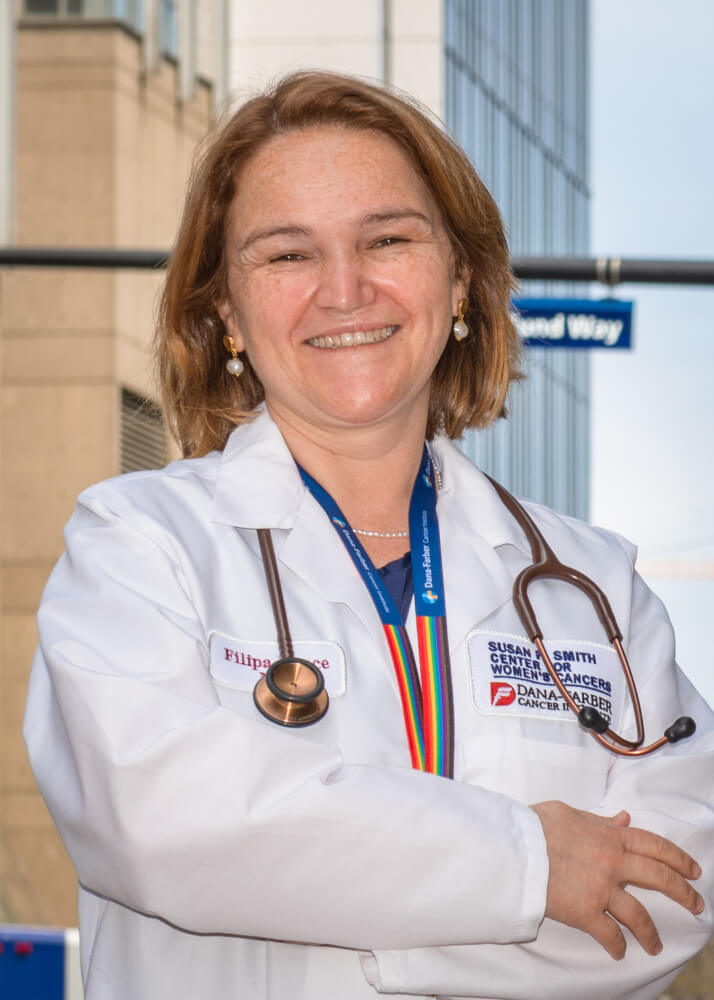Powered by recent research, scientists are making headway in understanding the basic biological mechanisms at work in inflammatory breast cancer (IBC) – and how to intervene in ways that may slow or stop the cancer.
Inflammatory breast cancer is a rare and aggressive form of breast cancer in which cancer cells block the lymph vessels in the skin of the breast, causing the breast to appear red or inflamed. Because it grows so quickly, it has often spread beyond its initial site by the time it’s discovered, making it difficult to treat. The main treatments include chemotherapy, surgical removal of the breast, and/or radiation therapy, often in combination.
Research into inflammatory breast cancer seeks to better understand the basic causes and course of the disease, including the role played by the immune system, and to use that information to develop new and more effective treatments. Studies are increasingly showing that not all cases of IBC are the same — that, just like other forms of breast cancer, genetic features of the tumor cells influence how rapidly the cancer grows and how it responds to treatment.
“We’re finding that the subtype of IBC — whether it’s hormone receptor-positive, HER2-positive, or triple-negative — matters when it comes to how patients do, just as it does in non-IBC breast cancers,” says Filipa Lynce, MD, director of Dana-Farber’s Inflammatory Breast Cancer Program. (Hormone receptor positive breast cancers are fueled by the hormones estrogen or progesterone; HER2-positive cancers have a surplus of the HER2 protein, which can be targeted by therapy; and triple-negative cancers are neither hormone receptor-positive nor HER2-positive.)

Recent studies: goals and findings
- A study co-led by Lynce found that patients with HER2-positive IBC respond well to therapies targeting HER2 — much like patients with HER2-positive non-IBC. This raises the possibility that such patients may be successfully treated with lower doses of highly targeted therapies than at present. A follow-up trial is exploring whether an antibody-drug conjugate — which delivers a chemotherapy agent directly to cancer cells — is safe and effective in these patients.
- A Dana-Farber led study that found that patients with IBC, particularly those with certain subtypes, have a significant risk of the cancer spreading to the central nervous system. The findings underscore the importance of seeking ways to prevent this kind of metastasis.
- A study led by Dana-Farber’s Kornelia Polyak, MD, PhD, showed that certain types of tumor cells that are common in patients with IBC are dependent on a molecular signaling pathway known as JAK2/STAT3. In laboratory models of IBC, the researchers found that a compound targeting that pathway, combined with the chemotherapy drug paclitaxel, decreased tumor growth more than either agent alone.
- A broad group of experts in IBC has developed a new set of criteria for diagnosing the disease. The diagnosis has traditionally been based on the presence of invasive cancer in the breast, along with redness and a buildup of fluid in the skin of the breast. The new criteria, presented in a 2022 paper, are meant to be more objective, involving not only the physical symptoms of the disease, but the appearance of tumor cells under a microscope and on imaging studies. Investigators at Dana-Farber and MD Anderson Cancer Center have recently conducted a follow-up study to see how well the new criteria distinguish IBC from non-IBC and how closely the new criteria align with the outcomes of treatment. Their findings were presented at the 2023 San Antonio Breast Cancer Symposium will be published soon.
- A clinical trial led by investigators at MD Anderson Cancer Center examined the safety and effectiveness of panitumumab, an antibody drug that targets a key growth protein in cancer, in patients with triple-negative IBC who have been treated with chemotherapy prior to surgery. The researchers found that the combination produced a complete pathologic response — a disappearance of all invasive cancer in the breast — in many patients. It isn’t clear yet whether this represents an improvement over standard therapy for patients with triple-negative breast cancer.
About the Medical Reviewer
 Dr. Lynce received her medical degree from the Universidade Nova de Lisboa, Portugal in 2004. She completed her residency in Internal Medicine and fellowship in Hematology and Medical Oncology at MedStar Washington Hospital Center/MedStar Georgetown University Hospital in Washington, DC. She was faculty at MedStar Georgetown University Hospital from 2015 to 2020 where she served as the institutional PI for Alliance and the co-PI for the National Capital Area (NCA) Minority/Underserved NCORP. In 2020, she joined the staff of Dana-Farber Cancer Institute and Brigham and Women's Hospital, where she is a medical oncologist and clinical investigator in the Breast Oncology Center. Her research focuses on inflammatory breast cancer, triple-negative breast cancer, BRCA-associated breast cancers and novel therapies in the treatment of breast cancer.
Dr. Lynce received her medical degree from the Universidade Nova de Lisboa, Portugal in 2004. She completed her residency in Internal Medicine and fellowship in Hematology and Medical Oncology at MedStar Washington Hospital Center/MedStar Georgetown University Hospital in Washington, DC. She was faculty at MedStar Georgetown University Hospital from 2015 to 2020 where she served as the institutional PI for Alliance and the co-PI for the National Capital Area (NCA) Minority/Underserved NCORP. In 2020, she joined the staff of Dana-Farber Cancer Institute and Brigham and Women's Hospital, where she is a medical oncologist and clinical investigator in the Breast Oncology Center. Her research focuses on inflammatory breast cancer, triple-negative breast cancer, BRCA-associated breast cancers and novel therapies in the treatment of breast cancer.